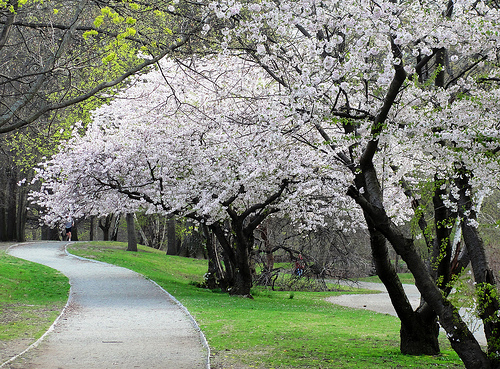But, no. Basically it's where you catch the placenta at birth (with a butterfly net or fishing pole), dehydrate it, grind it up and put it in capsules (like gel caps) to take after your birth. Surprisingly the thought of this does not make me gag. Let's go back to my 20s...when I was a tie-dye wearing, long braid having, granola eating hippy....
 |
| (this is my flashback sequence) |
Now that I am "in the family way," as they say around these parts, I have been doing a lot of reading and have watched more birthing videos than the average non-doula person. Before incubating this little cherub in my belly I thought that the placenta was essentially what is the amniotic sack; I thought the placenta surrounded the baby. Nope, it is just latched on to the uterine wall somewhere like a sucker fish (mine is anterior, or to the front) :
 |
| The anterior placenta is the illustration on the right. It's the red thing. |
The umbilical cord comes out of the placenta and is attached to the baby's belly which after birth will be cut, tied off and become the adorable little thing called the belly button. While in-utero the baby doesn't eat through it's mouth like us non-utero types, it get's its nutrients from the placenta. Read this paragraph I found at nutrition in the womb dot org:
"The placenta, which is part of the baby that attaches
it to the womb, captures nutrients from the mother’s
blood and transports them to the baby. The growth of
the placenta and the food it supplies are the key to
health for a lifetime. The placenta has three functions. It is the gate between mother and
baby, transferring food from the mother and waste from the baby; it makes hormones that
signal to the mother what the baby needs; and it protects the baby from the mother’s
immune system, which could attack the baby because it is "foreign" to the
mother’s body because half of its genes come from the father. The development of
the placenta begins when the embryo implants into the lining of the mother’s womb,
on the eighth day after conception. The organ becomes fully functional in the tenth week
of pregnancy. At birth its surface is oval in shape. It seems that the tissue along the
length of the surface has different functions to tissue along the breadth."
So, the placenta is full of good stuff (if you're eating well and not smoking crack.) The top reasons I found for eating your placenta (or placentophagy) are:
- It can help stem postpartum depression.
- It helps contract the uterus back to pre-pregnancy size = less bleeding.
- It stimulates milk production.
- It can help with infertility and impotence.
- All other mammals do it (excluding the camel and sea mammals.)
- If taking capsules you'll get "fish burps."
- Judgment from other people (EEEW! or It's cannibalism!)
- There haven't been any long term studies and if you eat well already it isn't necessary.
- It costs about $200 to have someone dry the placenta and encapsulate them for you (of course, if you do it yourself it is cheaper.)
- There must be a fifth reason...anyone like to chime in?
Listen to this lady talk about the benefits:
"Generally speaking, we're a well fed bunch so it's unlikely we'd need
to eat this because there's no peanut butter around. They have also
studied the reaction of animals if the placenta was with held after
birth and the animals weren't too miffed about it and didn't reject
their young."
"The placenta has a lot of good stuff in it, animals do it all the time and you don't see deers getting all weepy and telling their husbands they suck because they bought the wrong mustard and it certainly doesn't do any harm."
I took the topic to my facebook page and got a gazillion responses. I did ask if anyone had ingested their placenta and of course with facebook I got lots of non-placenta eaters offering their opinions but that's facebook for you. (This could be a good example of why not to join facebook, not that you needed ANOTHER reason.) This is a little hard to read but here is the "conversation":
One thing I dread is postpartum depression. I am not prone to depression but I know that PPD is pretty icky and out of your control - some women don't realize what's happening to them they just feel really blue. Some women have felt like bad mothers because of it. I feel like placenta encapsulation (because I don't think I could eat a placenta lasagna) would be worth a try if I did get the blues. The midwife at the birthcenter who does this charges $200 which is too spendy for me which has made me take a second look at a placenta lasagna or smoothie, like one friend suggested in that facebook thread.
After looking into the pros and cons I think I will ask to take the placenta home. Keep it in the freezer and if I get blue I'll look up some placenta recipes or attempt to dehydrate it and put it in gel caps myself. (That link, thankfully, does not have pictures, I looked at another placenta recipe link and gagged.) If I feel like I don't need it I will bury it like a good hippy would, under the dogwood tree.




No comments:
Post a Comment